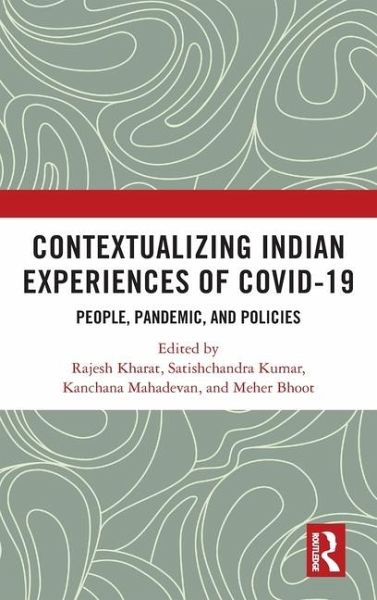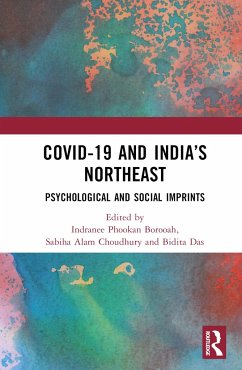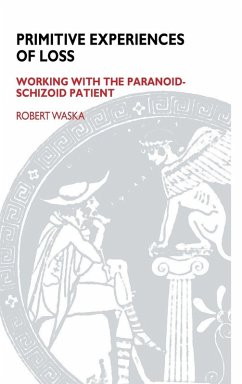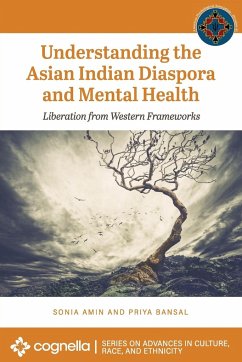Gebundenes Buch
Contextualizing Indian Experiences of Covid-19
People, Pandemic, and Policies
Herausgeber: Kharat, Rajesh; Mahadevan, Kanchana; Kumar, Satishchandra
Versandkostenfrei!
Versandfertig in 1-2 Wochen
Weitere Ausgaben:

PAYBACK Punkte
86 °P sammeln!




This volume captures the social, political, psychological, administrative and policy dimensions of COVID - 19 pandemic in the Indian context. The book is divided into four parts. Part I highlights the social narratives from the underprivileged workers, Asha workers, LGBTIQ+ community and Sanitary workers.
Rajesh Kharat is Professor and former Chairperson of the Centre for South Asian Studies, School of International Studies, JNU, and former Chief Advisor of EOO, JNU, New Delhi. He also served as Dean of Humanities at the University of Mumbai from 2019 to 2022 (on Deputation); he has an MA in Political Science from the University of Pune and an M.Phil. and Ph.D. from the Centre for South Asian Studies, SIS, JNU, New Delhi and LLB from University of Mumbai. He began teaching at the Department of Civics and Politics, University of Mumbai, in 1991, and has continued at JNU, New Delhi, since 2008. He is the recipient of the Latin American Council for Social Sciences, Argentina, and spent two months in Cuba in 2005. He has authored, edited, and co-edited 15 books and over 30 research papers. He has completed five major research projects in India and abroad on themes related to contemporary South Asia. As a Dean, he established the School of International Relations and Strategic Studies (SIRSS) at the University of Mumbai in 2021 and became the first Director of the SIRSS. He has also initiated three research online journals at the University of Mumbai and was Honorary Editor of Sambh¿¿ä, an interdisciplinary humanities online journal of the University of Mumbai. He was also a visitor's representative at the Executive Council of Mahatma Gandhi Central University, Bihar. Satishchandra Kumar is Professor and Head at the Department of Applied Psychology & Counselling Centre, University of Mumbai. He is also the former Coordinator of the Mahatma Gandhi Peace Centre. He received a Summer Fellowship from the Albert Ellis Institute in New York. He has also received a scholarship to undergo supervised training in the Enneagram Professional Training Programme from Helen Palmer Model San Francisco, USA. He was also awarded Research Fellowship by the Indian Council of Social Science Research (ICSSR), New Delhi. He has published in international peer-reviewed journals like the Journal of Personality and Social Psychology, Psychological Science, and British Journal of Guidance and Counselling. He has contributed to Sage's volume Eminent Indian Psychologists: 100 Years of Psychology in India. He has published over 50 research papers in national and internationally renowned journals. Apart from research publications, some edited books include Beyond the Ordinary: Stories that Inspire and Challenge and Some Outstanding Women of India. His research interest is industrial/organizational psychology, which provides for positive psychology, engagement at the workplace, and stress and coping. He is a reviewer in various international journals. He is also editor of Sambh¿¿ä, an interdisciplinary humanities online journal of the University of Mumbai. Kanchana Mahadevan is Professor at the Department of Philosophy, University of Mumbai. She has held visiting professorships at LUISS University, Rome (2016, 2019), and Leopold Franzens University, Innsbruck (2023). She has also been a senior fellow at the Justicia Amplificata, Goethe University Frankfurt and Bad Homburg (2018) and the Moore Institute, National University of Ireland, Galway (2019). She teaches and researches feminist philosophy, continental thought, critical theory, and political philosophy. She also works in the interdisciplinary areas of aesthetics and film. Her book Between Femininity and Feminism: Colonial and Postcolonial Perspectives on Care (DK Printworld and ICPR, 2014) examines the relevance of Western feminist philosophy in the Indian context while bringing Western feminism into dialogue with its Indian counterpart. Her publications on Ambedkar explore his re-articulation of democracy from the Indian perspective. In her recently published research papers on care ethics, she has explored its critical potential in relation to health work and the cosmopolitan character of care. She is the former editor of Sambh¿¿ä, an interdisciplinary humanities online journal of the University of Mumbai. Meher Bhoot is a Professor at the Department of German, University of Mumbai. Her areas of specialisation are German Literature with a focus on Literature of German Minorities, Postcolonial Studies, and Culture Studies, and her areas of interest are European cultural history and European history of art. She is an active member of the German Institutes Partnership with the Universities of Göttingen and Freiburg in Germany. Under the aegis of this partnership, she was Guest Professor at the Department of Intercultural German Studies, University of Göttingen, Germany, in 2017. She has been a DAAD Fellow since 2004 and received the Rotary Cultural and Ambassadorial Scholarship (1997-98). Apart from her published articles, some co-edited volumes include Revisiting Günter Grass , Voices from India and Germany, Interkulturelle Momente, Einfach menschlich. She has also co-edited textbooks for short courses on teaching Marathi to nonnative speakers, including Communicative Marathi for Nurses, Communicative Marathi for Rickshaw and Taxi Drivers, Communicative Marathi for Government Officials, and Communicative Marathi for Bank Employees. She has recently authored a book in German entitled Nicht Herkunft, sondern Dasein: Kulturelle Identität im Werke Rafik Schamis / Not Origin, but Existence: Cultural Identity in the Works of Rafik Schami (Würzburg: Könighausen & Neumann, 2023). She is the former co-editor of Sambh¿¿ä, an interdisciplinary humanities online journal of the University of Mumbai.
Produktdetails
- Verlag: Routledge India
- Seitenzahl: 388
- Erscheinungstermin: 6. August 2024
- Englisch
- Abmessung: 240mm x 161mm x 25mm
- Gewicht: 746g
- ISBN-13: 9781032291857
- ISBN-10: 1032291850
- Artikelnr.: 70149666
Herstellerkennzeichnung
Libri GmbH
Europaallee 1
36244 Bad Hersfeld
gpsr@libri.de
Für dieses Produkt wurde noch keine Bewertung abgegeben. Wir würden uns sehr freuen, wenn du die erste Bewertung schreibst!
Eine Bewertung schreiben
Eine Bewertung schreiben
Andere Kunden interessierten sich für














